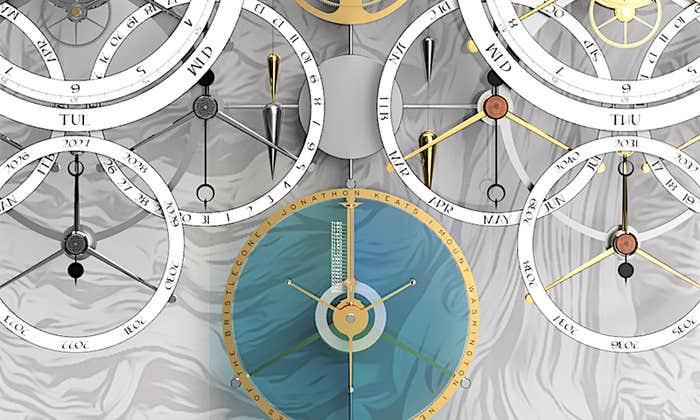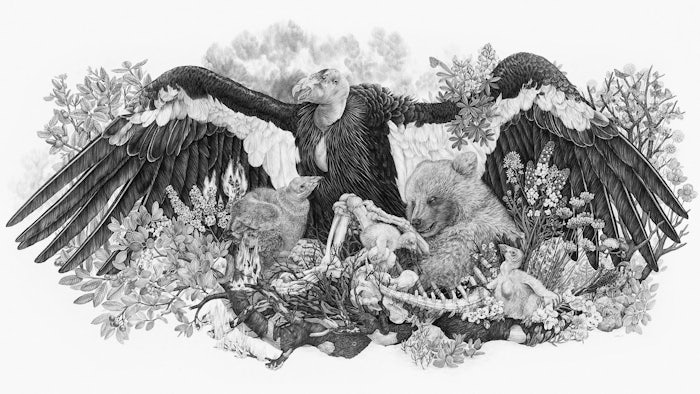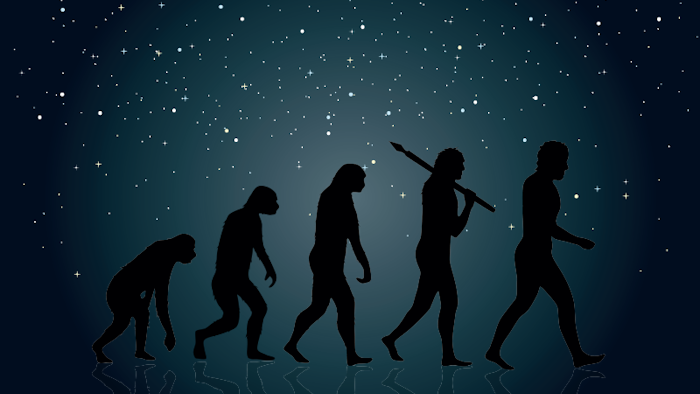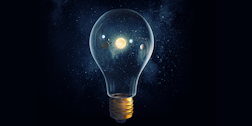In the past quarter century, enrollment in college English departments has sunk like the Pequod in Moby Dick. Meanwhile enrollment in science programs has skyrocketed. It’s understandable. Elon Musk, not Herman Melville, is the role model of the digital economy. But it doesn’t have to be that way, says Angus Fletcher, 44, an English professor at Ohio State University. Fletcher is part of “group of renegades,” he says, who are on a mission to plug literature back into the electric heart of contemporary life and culture. Fletcher has a plan—“apply science and engineering to literature”—and a syllabus, Wonderworks: The 25 Most Powerful Inventions in the History of Literature, his new book.
Before the England-born Fletcher got his Ph.D. in literature at Yale, he earned an undergraduate degree in neuroscience, followed by a four-year stint in a neurophysiology lab at the University of Michigan. He switched careers when he realized the biology of the brain wouldn’t take him far enough toward understanding our need for stories. “What’s special about the human brain is its power of storytelling,” Fletcher says. “Its power of narrative. Its power to invent futures and tell our past. So, I thought, ‘I’ll go to an English department and learn about narrative.’” Fletcher sees the human brain as mechanical, but insists it doesn’t operate like a computer. He spelled out his view for Nautilus readers in “Why Computers Will Never Write Good Novels.” (The essay generated a lot of discussion. See Fletcher’s response below.)
Wonderworks consists of 25 chapters that delve into works from the Iliad to Emma, In Search of Lost Time to My Brilliant Friend, each representative of a particular “invention” to lighten sorrow or grief or create empathy or joy. “Each of these inventions had a unique purpose, engineered with its own intricate circuitry to click into our psyche in a different way,” Fletcher writes. Wonderworks is captivating, as is Fletcher, who speaks with infectious enthusiasm and clarity. I began our conversation on Zoom with a question about the difference between the human brain and a computer, the subject of his Nautilus article, and then turned to his provocative view that to save the humanities, literature must be taught as a science.

Is a big part of the difference between human brains and computers the fact that computers lack consciousness?
No. I’m making a completely mechanical argument for novels, literature, and narrative. Consciousness is like the existence of the 913th dimension. It may exist. It’s not up to me to say that it doesn’t exist. But I can tell you right now, no human is ever going to establish a definitive proof one way or the other. That’s because it’s a metaphysical problem. Humans exist in a physical space. The reason science and engineering have advanced is because we bracketed the problem of consciousness as something unanswerable. So it’s possible that computers are conscious. It’s possible that they’re not. That’s something I don’t think anyone can answer.
How did science advance because the problem of consciousness is unanswerable?
Let me say it this way. We can get everything we want in the world without understanding where consciousness comes from. So why are we pouring all this energy into it? The only reason for doing it is because people have a religious spiritual impulse. It’s like chasing God. We know where that got the monks in the Middle Ages.
Where did that get the monks?
It didn’t get them to invent the laws of thermodynamics or invent computers or discover evolution by natural selection. It got them into a lot of arguments. I think humans enjoy having arguments about irresolvable problems. It gives us something to do. What’s the best baseball team? What’s the source of consciousness? But other than as a ludic pastime, consciousness is not something that I think anyone would seriously investigate scientifically.
Pragmatism isn’t the enemy of beauty. Pragmatism allows beauty to happen.
Are you saying the study of metaphysics did not lead to developments in science?
That’s exactly right. That’s the narrative I would tell. In the Middle Ages, people were obsessed with the questions, “Who is God? What does God want?” But we discovered over time, starting with Machiavelli and moving into Francis Bacon and the 19th- and 20th-century scientific revolutions, that the human brain can’t answer those questions. That’s because the human brain has evolved to practice science. Science is about making hypotheses and testing them in our physical world. It’s not about reaching the metaphysical. And literature is the origin of the modern scientific method.
Why do you call literature a technology?
A technology is any human-made thing that solves a problem. Most of our technology exists to master our world, to domesticate space. That’s why we have smartphones and smart homes and satellites. Literature tackles the opposite set of problems: not how to master the nonhuman world but how to master ourselves. It wrestles with the psychological problems inside us. Grief, lack of meaning, loneliness—literature was invented to deal with these problems. To have happy and democratic societies, effective engineers and scientists, we need people who are joyful, not angry, who have a deep sense of empathy and purpose, who have an ability for logic and problem-solving. You get all these things from literature.
When you call literature a technology, it sounds like you’re saying literature’s a machine.
I am saying it’s a machine! It’s a machine designed to work in concert with another machine, our brain. The purpose of the two machines is to accelerate each other. Literature is a way of accelerating human imagination. And human imaginations accelerate literature. This technology is just sitting on our bookshelves and almost none of us are using it. Students now flee literature departments for the sciences and engineering.
That makes the act of imagination sound so mechanical, don’t you think?
In one regard, narrative is a mechanical act. It doesn’t require imagination. It doesn’t require free will. It’s possible humans have no imagination and no free will. Yet we can still write novels and poetry because the fundamental constituent of those things is narrative. Now, the reason that people sometimes think that narrative is creative or imaginative is because narrative is not logical. It exists in the hypothetical, the counterfactual, the speculative. You can never write a true or a false novel. All you can write is a fictional novel. That’s why we might think of it as being imaginative. In the same way, we might think of anything that an engineer creates as being imaginative. But what we’re really saying is the novel is outside the realm of the logical. It’s in a different machine space, the machine space of narrative.
In the past 20 years, enrollment in English departments has dropped by 25 percent, while enrollment in STEM classes has doubled. Why is that?
I can tell you exactly why that is. English literature is not being taught in a way that is connecting with people. We’ve been taught in school to interpret literature, to say what it means, to identify its themes and arguments. But when you do that, you’re working against literature. I’m saying we need to find these technologies, these inventions, and connect them to your head, see what they can do for your brain. Literature isn’t about telling you what’s right or wrong or about giving you ideas. It’s about helping you troubleshoot your own head.
The chapters in Wonderworks include fun names for the inventions of literature. The names include “Almighty Heart,” “Serenity Elevator,” “Sorrow Resolver,” “Virtual Scientist.” How did literature invent the virtual scientist?
A virtual scientist has no ego. Our brains are born scientists. From the moment we’re born, we make hypotheses about what will happen if we do something. Then we test those hypotheses. We might say, “If I stick my hand in the fire, it might burn.” And then we stick our hand in the fire. We’re like, “Yes, that did burn.” We’re constantly running these experiments in our lives. We build stories and narratives as a way of organizing them. But what holds us back as scientists is our egos. That’s because we just don’t like to think we’re wrong. Present someone with a piece of data that contradicts what they think and they will deny your data. They will bend your data to fit their hypothesis. This is an endemic psychological process of the human mind.
So the question is, “How do we become better scientists?” The way to do that is to remove our ego. Literature provides us the space to do that. What is Sherlock Holmes doing? Sherlock Holmes has given us a problem that we need to solve experimentally by positing hypotheses, by testing them. But we’re not Sherlock Holmes and so it’s not embarrassing if we happen to be wrong. Sherlock Holmes and tons of great detective fiction allow us to play virtual scientists by going into a space where our ego doesn’t exist and we can practice our scientific method of making predictions and testing them.
Most of our technology exists to domesticate space. Literature tackles the opposite: how to master ourselves.
I will say, Angus, Wonderworks made me a little anxious. I’m sure you know Auden’s lines from “In Memory of W.B. Yeats”: “For poetry makes nothing happen: it survives/In the valley of its making where executives/Would never want to tamper …” Reading literature as instructional makes me a little queasy. I read Proust for his mad rhapsodies and not for his “therapeutic effect.” That seems reductive, or worse, like self-help.
If I was saying, “Kevin, ‘I want to delete all the other works of literary criticism in the world and I want everyone to only read Wonderworks,’” then I would agree with you. But what I’m saying is there are lots of gorgeous, wonderful, important works of literary criticism that celebrate exactly the qualities you’re talking about, but there’s not a single book out there that does what Wonderworks does. I’m not trying to stop people from reading those other books. I’m just trying to say that we have thousands of those books already out there—and the humanities are still collapsing. The reality is if we don’t figure out a way to turn around this slide, there aren’t going to be classes anymore on Proust. There aren’t going to be classes on the writers we love. We have to figure out a way to balance desire for the pure, non-utilitarian nature of literature with the recognition that pragmatism isn’t bad.
I’ve never heard it put like that before: Pragmatism isn’t bad for literature.
It’s not. Pragmatism isn’t the enemy of beauty. Pragmatism allows beauty to happen. If you’re not fed, if you don’t have a museum, if you don’t have paints, if you don’t have ink and printing presses, you don’t have beauty. So let’s acknowledge that pragmatism can work to support beauty and not displace or replace it. In the same way that the body supports the mind, let’s feed the body. Let’s see what literature can do for our physical nature.
Are you saying we’ve lost the pragmatic value of art?
Yes, we’ve lost a crucial part of literature and art—the part that works below our conscious mind on these deep parts of our brain, the parts that give us joy and optimism and hope and healing. By recovering those parts, we can allow all the things that are going on in English literature departments to continue. But if we don’t recover those parts, English departments are going to be gone.
Do you think a need for literature is baked into our evolutionary nature?
What I think is baked into our evolutionary nature is our need for meaning. What’s also baked into our evolutionary nature is our desire to tell stories from a beginning to an end. When we come into this world, we think, “Where’s this story going?” For today to matter to us, we need to be able to see tomorrow and the next day.
In the same way, we’re obsessed with the question, “Where did it all come from?” Other animals aren’t obsessed with this question. But humans are. “What was our origin? Where did the universe come from?” These are intrinsic questions in our brains. And literature from the beginning was the most effective way of answering them by spinning time backward and forward in fictional ways. Literature is very effective at generating a sense of wonder, which is the most basic and primordial spiritual experience.
We need wonder in our days. That’s why most of us, when we read poetry, don’t like to think of it as being utilitarian. We like to think of it as bigger than that, as the purpose beyond. But our brains are only capable of a neurological spiritual experience. That’s why we need literature. Our brains need literature the way that our bodies need food. Literature provides our brains with basic sustenance.
How would you respond to parents who might say, “My kids are never going to get a job studying literature. They need to study science, business, law. Why should they take literature classes?”
I don’t think anyone should do anything. I’m not a totalitarian. I’m simply saying that if you decide that you want to take a literature class, it will enrich your life emotionally, intellectually, and creatively. It will allow you to imagine more dynamically. It will also allow you to problem-solve more effectively.
Independent of those things, narrative and stories are the most powerful thing that humans have. They are what have allowed Elon Musk to hijack our modern conversation about Mars and the future. That’s all narrative. There’s nothing actually new about SpaceX. It’s just NASA. But Musk has been able to tell this story.
So if you want to be successful in business, if you want to be successful in science, if you want to be successful in anything, you need to understand stories and how they work. On a fundamental level, there’s no better way to understand stories than through literature.
Kevin Berger is the editor of Nautilus.
Lead image: Andrey_Kuzmin / Shutterstock



















